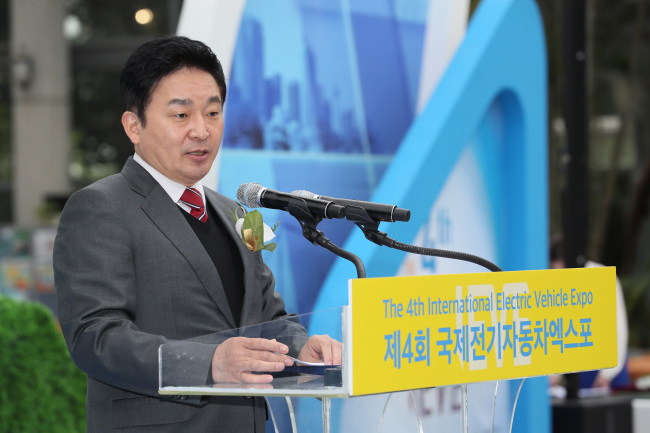Jeju seeks industrial transformation via carbon-free tech
Korea’s southernmost island aims to become role model for green cities
By Korea HeraldPublished : March 21, 2017 - 16:56
Forget about the Jeju that you used to know. The nation’s southern resort island, famous for its natural surroundings, slow pace of life and fresh seafood, is seeking an industrial transformation through the development of carbon-free technology.
By 2030, the island with a population of 600,000 plans to replace all vehicles with electric cars. One hundred percent of electric power will also be generated from renewable energy and will be supplied via a smart grid system.
By 2030, the island with a population of 600,000 plans to replace all vehicles with electric cars. One hundred percent of electric power will also be generated from renewable energy and will be supplied via a smart grid system.

This innovative idea is being led by Jeju Special Self-Governing Province Gov. Won Hee-ryong who believes that the island is a perfect role model for cities that want to go green in the future.
“Jeju represents ‘the green big bang model’ as the island has come up with concrete ideas to deal with climate change and to promote convergence among technologies, one of the fundamentals of the fourth industrial transformation,” he said at the Global EV Summit held on the sidelines of the fourth International Electric Vehicle Expo on the island.
During the summit, which discussed a possible paradigm shift to carbon-free technology operated by artificial intelligence, Won vowed that Jeju will present a new vision for future cities around the world.
“Autonomous cars based on AI technology, would raise the existing (traffic) infrastructure, including parking lots, to a new level as it would go along with the development of a car-sharing system,” he said.
“More than half of the nation’s EVs are registered in Jeju -- enough to demonstrate and suggest its future as (a carbon-free) city,” said Won, who is an enthusiastic EV driver. The island raised its proportion of renewable energy from 6.43 percent in 2014 to 11.55 percent last year, he added.
Interconnection between smart grids and energy storage systems is the core element of Jeju’s green vision, as it has been deploying energy storage systems across the island to minimize the intermittence of electricity generation by wind and solar energy. Utilizing big data is also crucial as it provides the most optimized environment to efficiently operate self-driving cars and telecommunication services. The year 2020 is to be a turning point for EVs, considering the speed of its technological advancement, he added.
The self-governing provincial government has been leading the distribution of EVs by expanding infrastructure and providing hefty financial subsidies. Jeju is a natural fit for EVs as the island itself is oval-shaped with a 200-kilometer round track – a distance that can be traveled around with a single battery charge. Jeju also has electric charging stations every 3.5 square kilometers.
The reason why Jeju has been pushing its green drive, particularly with EVs, comes from a fundamental mission: keeping the island’s legacy as a clean place, the governor said.
“Jeju can seek additional developments only by sustaining its clean environment. In the face of climate change, Jeju has to be a place that cuts the use of fossil fuels and I believe that is the only way to keep its clean environment (while seeking industrial development at the same time).”
By Cho Chung-un (christory@heraldcorp.com)
-
Articles by Korea Herald



![[Exclusive] Korean military set to ban iPhones over 'security' concerns](http://res.heraldm.com/phpwas/restmb_idxmake.php?idx=644&simg=/content/image/2024/04/23/20240423050599_0.jpg&u=20240423183955)

![[Graphic News] 77% of young Koreans still financially dependent](http://res.heraldm.com/phpwas/restmb_idxmake.php?idx=644&simg=/content/image/2024/04/22/20240422050762_0.gif&u=)



![[Pressure points] Leggings in public: Fashion statement or social faux pas?](http://res.heraldm.com/phpwas/restmb_idxmake.php?idx=644&simg=/content/image/2024/04/23/20240423050669_0.jpg&u=)










